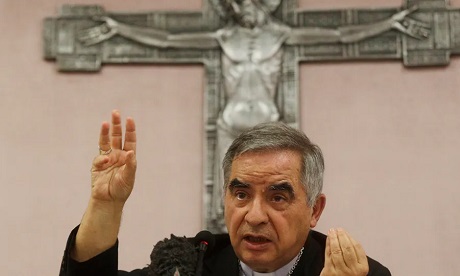The Vatican City’s promoter of justice asked judges Wednesday to sentence Cardinal Angelo Becciu to more than seven years in prison, as he made closing arguments in the landmark financial crimes trial.
But do prosecutors really have a case against Becciu?
In his argument July 26, Alessandro Diddi spent the day focused on Becciu, the former sostituto of the secretariat, whose defense Diddi described as “masterpieces of falsification and mystification of reality.”
The cardinal, in turn, has declared his “absolute innocence” and himself to be “a faithful servant of the Church” who has “suffered in silence” throughout a process he’s called a witch hunt and media smear campaign.
Away from the courtroom hyperbole, though, there is perhaps one thing on which Becciu and Diddi would agree: The case is complicated.
According to the official charge sheet, he is accused of embezzlement and abuse of office, conspiracy, as well as the subornation of witnesses. But how does this break down, and does the evidence add up?
All roads lead through London
According to most media coverage of the trial, the primary focus of the evidence and the charges — including against Cardinal Becciu — is the Secretariat of State’s now-infamous purchase of a London building at 60 Sloane Avenue.
But that story, however popular, isn’t quite right.
The London deal may be at the center of the trial, but the charges, accusations, and evidence extend back years before the deal was concluded, and well into the months after.
The 2018 acquisition of the building by the secretariat was a messy affair, to put it mildly.
And it was the building’s purchase which started the investigation which led to the current trial.
And it was the complicated structuring of the purchase which led to charges of extortion and other crimes for defendants, most notably the businessman Gianluigi Torzi.
But Cardinal Becciu has insisted that he had nothing to do with the purchase of the London building, and that the deal was done after he had left the Secretariat of State in June of 2018 and it was managed by his successor as sostituto, Archbishop Edgar Peña Parra.
In that, Becciu has a point. He did not, so far as the available evidence shows, have anything to do with the decision to buy the building outright, or with approving the details which left the Vatican wide open to (alleged) fraud and extortion.
Still, that is only part of the story.
The purchase of the building — which lost the Vatican more than 100 million euros — was part of a hasty settlement as the secretariat severed ties with the financier Raffaele Mincione, with whom it had invested some 200 million euros in 2014.
That initial investment was approved by Becciu, as was its financing, and the unusual way it was recorded on Vatican balance sheets.
And those actions are part of the prosecution case — though the cardinal has insisted he cannot remember much of what he approved, or explain his reasons, even when presented with documents bearing his signature.
And as has been reported since before the trial began, when the newly created Secretariat for the Economy and Office of the Auditor General tried to look through the Secretariat of State’s books for a curia-wide audit in 2015-16, it was Becciu who led the resistance to scrutiny.
According to reporting at the time — and later confirmed both by Cardinal George Pell, the first prefect of the Secretariat for the Economy, and Libero Milone, the first auditor general — the secretariat under Becciu’s leadership used forbidden accounting practices to effectively hide the whole 200 million euro investment with Mincione from auditors, along with the bank loans used to finance the investment.
Becciu has made several evolving claims in his own defense since.
He has said, at different times, that he never refused to cooperate with Pell and Milone; that Pell and Milone’s departments never had the authority to audit the Secretariat of State anyway; and that he did act to shield the specific investments from scrutiny because they were some kind of secret discretionary papal fund outside of Vatican financial laws.
In addition to Pell (who died earlier this year) and Milone’s insistence that none of these defenses are true, the plain text of the statutes of both their former departments — issued by Pope Francis — seems clearly to give them total access to and oversight of all Vatican departments and funds, with no exceptions. Read more
- Ed Condon is a co-founder and editor of The Pillar.
- First published in The Pillar.
